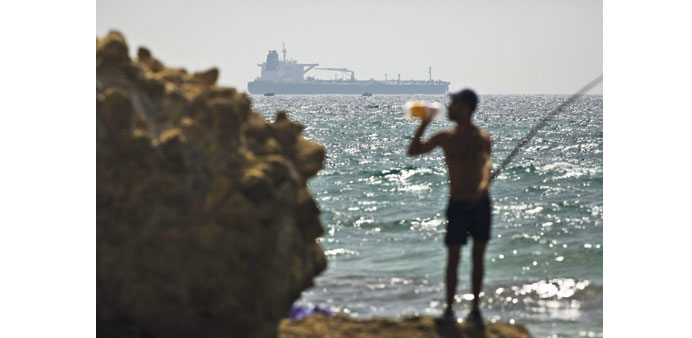Reuters
A tanker carrying crude oil from Iraqi Kurdistan was cleared by the US Coast Guard to unload its cargo at sea off Texas on Sunday as a State Department official signaled Washington would not intervene to block delivery of the controversial crude.
Coast Guard officials went aboard the tanker United Kalavrvta on Sunday and verified the ship and crew’s ability to safely offload the oil, a Coast Guard spokesman said.
The ship set sail from the Turkish port of Ceyhan in June with a load of crude oil supplied by a new pipeline from the Kurdish oilfields.
Trading sources in Texas, New York, London and Geneva have been unable to identify the buyer of the United Kalavrvta’s cargo. The oil could go to any one of the many refineries located along the US Gulf Coast.
The ship carries approximately 1mn barrels of crude, which would fetch more than $100mn at international prices.
Sale of Kurdish crude oil to a US refinery would infuriate Baghdad, which sees such deals as smuggling, raising questions about Washington’s commitment to preventing oil sales from the autonomous region.
The US government has expressed fears that independent oil sales from Kurdistan could contribute to the breakup of Iraq as the government in Baghdad struggles to contain the ultra-hardline State, a group of Sunni Islamists who have captured vast areas of the country. But it also has grown frustrated with Iraqi Prime Minister Nuri al-Maliki’s handling of the crisis.
The tanker anchored on Saturday night in an area off the port of Galeveston, Texas, where ships too large to transit the Houston Ship Channel offload oil to smaller tankers for delivery to the US mainland.
Throughout Saturday and Sunday, the Coast Guard was in communication with the US National Security Council, and departments of State and Homeland Security, said Petty Officer Andy Kendrick.
To deliver the crude the tanker only had to show it could do so in compliance with Coast Guard regulations, Kendrick said. “We didn’t have any extra stuff to impose on them,” he said.
Crude offloading could begin as soon as the ship arranges a contract with a company that performs lightering, as the process is called, he said. Lightering, depending the size of the cargo, can take several hours and even days.
Attempts to contact the ship’s owner and the vessel itself were unsuccessful.
A State Department official, speaking on condition of anonymity on Sunday because of the sensitivity of the issue, said officials were well aware the ship’s location and cargo.
“This is a private commercial matter,” the official said. “Our policy has not changed. Iraq’s energy resources belong to all of the Iraqi people. As in many cases involving legal disputes, the US informs the parties of the dispute and recommends they make their own decision with advice of counsel.”
Washington has pressured companies and governments not to buy crude from the Kurdish Regional Government (KRG), but it has stopped short of banning purchases by US firms.
The KRG has renewed its push for an independent state amid the latest violence roiling Iraq. Its relationship with Baghdad has deteriorated over what it sees as Maliki’s role in stoking the crisis and the long-running dispute over oil sales.
Baghdad has threatened to sue anyone that buys Kurdish oil.
Sale of Kurdish crude oil to a US refinery would infuriate Baghdad, which sees such deals as smuggling, raising questions about Washington’s commitment to preventing oil sales from the autonomous region
Oil falls on ample supply, weak demand
Brent crude oil slipped yesterday as forecasts for ample supplies in the Atlantic basin and weak demand in Europe and Asia mitigated fears of escalating tension in Ukraine and the Middle East.
Oil prices on both sides of the Atlantic were down sharply in late morning trading as reports emerged that North Sea and West African physical crude markets were oversupplied, with sellers discounting heavily to attract buyers such as refiners.
North Sea crude oil cargoes for immediate lifting are trading at deep discounts to later ones, at more than $1.50 per barrel below the front futures month.
Traders reported about 30mn unsold barrels of West African crude for lifting in August, and September cargoes were already becoming available, further depressing the market.
“The market is now focusing on weak fundamentals,” said analyst Gene McGillian of Tradition Energy in Stamford, Connecticut. “If it wasn’t for the geopolitical risk we priced in last week, the market would be at an even lower level.”
September Brent was down 93 cents at $107.46 a barrel by 11:45 am EDT (1545 GMT). US crude futures for September fell 43 cents to $101.66 after ending last week 1% lower.
Oversupply in the West African oil market was a bearish sign that the global market was being pressured by weak refining margins and unseasonably low gasoline demand. “Weak refining margins in all regions, including the US, argue that the situation won’t turn around quickly,” said oil analyst Michael Wittner of Societe Generale.
Further pressure on oil prices came from reports that US pending home sales fell 1.1% last month, a decline that confounded economists’ expectations of a 0.5% gain and cast a cloud over the housing market recovery.
Global political tensions continued to underpin oil prices against the backdrop of weak fundamentals.
In Ukraine, clashes between government troops and pro-Russian rebels intensified on Sunday, killing at least 13. The US and the European Union will discuss further economic sanctions on Russia this week, but the market did not appear to be worried by the risk of disruption to oil supplies.

